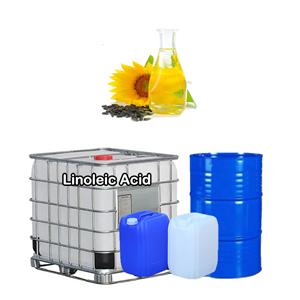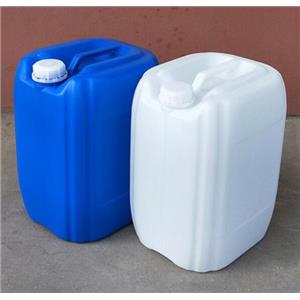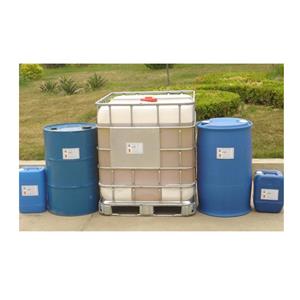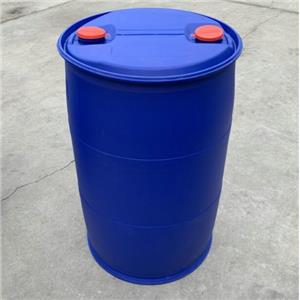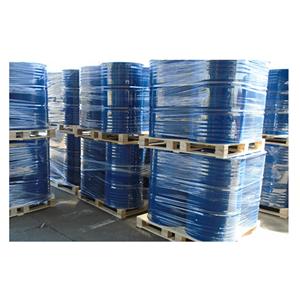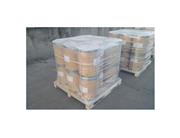1/5
Linoleic Acid NEW
- Min. Order1kg
- Purity95%
- Cas No60-33-3
- Supply Ability20MT
- Update time2025-03-20

| Product Name | Linoleic Acid |
| CAS No | 60-33-3 |
| EC-No | 200-470-9 |
| Min. Order | 1kg |
| Purity | 95% |
| Supply Ability | 20MT |
| Release date | 2025/03/20 |
Introduction of Linoleic Acid from Watson Biotechnology Co., Ltd
Basic Information of Linoleic Acid | |
Product Name | Linoleic Acid |
CAS NO. | 60-33-3 |
Apperance | Light Yellow Liquid |
Assay | 95% |
Pacakge | 1kg/Bottle,20kg/180kg/Drum, |
MOQ | 1kg |
Storage | Cool and dry place |
Shelf Life | 2 Years |
Brand | Watson |
Specifications(COA) of Cosmetic and Food Grade Linoleic Acid CAS NO 60-33-3 Nature Extract from Plant Oil High Purity GC95%
ITEMS | SPECIFICATIONS | RESULTS |
Appearance | Light Yellow Liquid | Conform |
Acid Value(mgKOH/g) | ≥190.0 | 193.1 |
Water % | ≤0.1 | 0.01 |
Assay | 95±1 | 94.9 |
Conclusion | QUALIFIED. | |
What is linoleic acid?
Linoleic acid is an essential omega-6 fatty acid, meaning that the human body cannot produce it on its own and must obtain it from dietary sources. It is a polyunsaturated fatty acid with 18 carbon atoms and two double bonds, making it chemically known as cis-9, cis-12-octadecadienoic acid.
Linoleic acid plays several crucial roles in the body, including serving as a precursor for the synthesis of other important compounds, such as arachidonic acid, which is further metabolized into various signaling molecules involved in inflammation and immune responses. Additionally, linoleic acid is a component of cell membranes and is involved in maintaining their structure and function.
Good dietary sources of linoleic acid include vegetable oils (such as soybean, sunflower, safflower, and corn oil), nuts, seeds, and certain types of meat.
What is the application of linoleic acid?
Linoleic acid has various applications across different industries:
Cosmetics and Personal Care: Linoleic acid is often included in skincare products due to its moisturizing properties. It helps to maintain the skin's barrier function, preventing moisture loss and promoting hydration. It is also believed to have anti-inflammatory effects, making it beneficial for soothing irritated or sensitive skin.
Dietary Supplements: Linoleic acid is commonly included in dietary supplements, particularly those marketed for their potential benefits for heart health and skin health. These supplements may contain linoleic acid in the form of capsules, soft gels, or liquid oils.
Food Industry: Linoleic acid-rich oils, such as soybean oil, sunflower oil, and corn oil, are widely used in cooking and food processing. These oils are used for frying, baking, salad dressings, and as ingredients in various food products.
Industrial Applications: Linoleic acid derivatives are utilized in industrial processes, such as the production of surfactants, emulsifiers, and lubricants.
Pharmaceuticals: Linoleic acid and its derivatives are being investigated for their potential therapeutic applications in the pharmaceutical industry. Research suggests that they may have anti-inflammatory, antioxidant, and other health-promoting properties.
Overall, linoleic acid's diverse properties make it valuable in a range of applications, from skincare to food production to industrial processes.
What is the source of linoleic acid?
Linoleic acid is primarily sourced from plant-based foods, particularly vegetable oils. Some of the richest sources of linoleic acid include:
Soybean Oil: Soybean oil is one of the most abundant sources of linoleic acid. It is widely used in cooking and food processing.
Sunflower Oil: Sunflower oil is another popular cooking oil rich in linoleic acid.
Safflower Oil: Safflower oil contains high levels of linoleic acid and is used for cooking and in salad dressings.
Corn Oil: Corn oil is derived from corn kernels and is a good source of linoleic acid.
Cottonseed Oil: Cottonseed oil is extracted from the seeds of cotton plants and contains a significant amount of linoleic acid.
Sesame Oil: Sesame oil, derived from sesame seeds, also contains linoleic acid, although in smaller amounts compared to other vegetable oils.
Nuts and Seeds: Various nuts and seeds contain linoleic acid, albeit in smaller quantities compared to oils. Examples include walnuts, almonds, and pumpkin seeds.
Avocado: Avocado contains some linoleic acid, making it a minor source compared to oils but still contributing to dietary intake.
These plant-based sources are rich in linoleic acid and can be incorporated into the diet to ensure an adequate intake of this essential fatty acid.
What is the effect of linoleic acid for human body?
Linoleic acid, as an essential omega-6 fatty acid, plays several important roles in the human body. Here are some of its effects:
Cell Membrane Structure: Linoleic acid is a key component of cell membranes, where it helps maintain their structure and fluidity. This is crucial for cellular function and communication.
Precursor to Signaling Molecules: Linoleic acid serves as a precursor for the synthesis of other important compounds, such as arachidonic acid. Arachidonic acid, in turn, is further metabolized into various signaling molecules known as eicosanoids, which play roles in inflammation, immune responses, and other physiological processes.
Skin Health: Linoleic acid is important for maintaining the health and integrity of the skin. It helps to form a protective barrier on the skin's surface, preventing moisture loss and protecting against environmental damage. Some research suggests that linoleic acid may also have anti-inflammatory effects, which can benefit skin conditions such as acne and eczema.
Heart Health: While the relationship between linoleic acid intake and cardiovascular health is complex and still under investigation, some studies suggest that higher intake of linoleic acid, particularly from sources such as vegetable oils, may be associated with a reduced risk of heart disease. This is thought to be due to its ability to lower levels of LDL (bad) cholesterol in the blood.
Brain Function: Omega-6 fatty acids, including linoleic acid, are important for brain development and function. They are incorporated into cell membranes in the brain and play roles in neurotransmission and signaling.
Immune Function: Linoleic acid is involved in modulating immune responses and inflammation. Proper balance of omega-6 fatty acids, including linoleic acid, with omega-3 fatty acids is important for maintaining immune function and inflammation at healthy levels.
It's important to note that while linoleic acid is essential for health, excessive intake of omega-6 fatty acids relative to omega-3 fatty acids may contribute to inflammation and certain chronic diseases. Therefore, maintaining a balanced ratio of omega-6 to omega-3 fatty acids in the diet is recommended for overall health.
What is the difference of conjugated linoleic acid and linoleic acid?
Conjugated linoleic acid (CLA) and linoleic acid (LA) are both forms of fatty acids, but they differ in their chemical structure and biological effects.
Chemical Structure:
Linoleic Acid (LA): Linoleic acid is a polyunsaturated omega-6 fatty acid with 18 carbon atoms and two double bonds. It has the chemical formula C18H32O2 and is commonly found in vegetable oils such as soybean oil, sunflower oil, and corn oil.
Conjugated Linoleic Acid (CLA): Conjugated linoleic acid refers to a group of geometric and positional isomers of linoleic acid. These isomers have their double bonds arranged in a conjugated fashion, meaning that they are separated by a single bond rather than the usual methylene groups. CLA is naturally found in small amounts in meat and dairy products, particularly those from ruminant animals such as cows and sheep.
Biological Effects:
Linoleic Acid (LA): Linoleic acid is an essential fatty acid that plays various roles in the body, including serving as a precursor for the synthesis of other important compounds, maintaining cell membrane structure, supporting skin health, and modulating inflammation and immune responses.
Conjugated Linoleic Acid (CLA): CLA has been studied for its potential health benefits, which may include anti-inflammatory, anti-cancer, weight management, and cardiovascular health effects. However, the scientific evidence regarding these benefits is mixed, and more research is needed to fully understand the mechanisms and potential therapeutic applications of CLA.
In summary, linoleic acid is a specific omega-6 fatty acid with two double bonds in its structure, while conjugated linoleic acid refers to a group of geometric and positional isomers of linoleic acid with conjugated double bonds. Both have distinct biological effects and potential health implications.
FAQ From Watson Biotechnology Co., Ltd | |
Q | Can I get a sample for free ? |
A | For small QTY and low value product, we can provide sample for free exclude shipping cost. For high value sample, we will charge the basic sample cost, but we can refund all the cost if customers place order after sample test. |
Q | How to confirm the product quality before placing orders ? |
A | Most of our products confirm to international standards like USP/EP/BP/JP/CP. We will provide COA/TDS/MSDS for customers to confirm the specification before placing order. |
Q | What is the payment you accept? |
A | For small and low value order, we accept CreditCard, MaterCard,VISA,Western Union and T/T.For large order, we can do T/T and L/C. Any pay on delivery or pay-after are not available for us. |
Q | What is your shipment way ? |
A | For less than 100kg gross weight order will ship with courier like FedEx or UPS, we support customers to place courier orders remotely by their account, we will package the goods well and wait for pick up.For more than 100kg goods, we will transport by Air or Sea according to customers' requirement. |
Q | How long is your after-sales service? |
A | We accept customer’s quality complaint in three month after customer received the goods. We provide tech.support for all-life if customer place order from our company. |
Q | How do you treat quality complaint ? |
A | We support customer to provide our products to any rightful third party testing organization to test our products according to the COA specification, if the test result is confirm with COA, we will take all the loss for customers. |
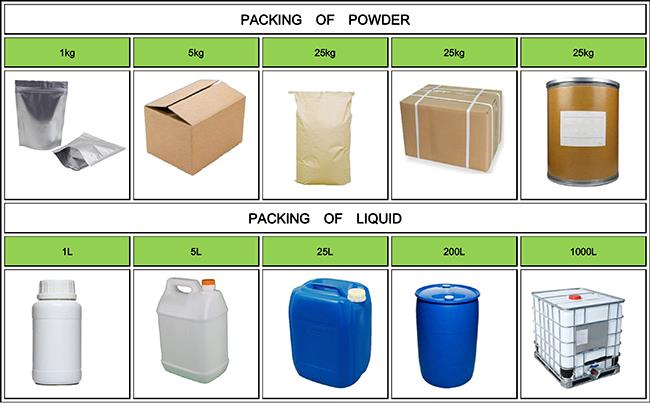

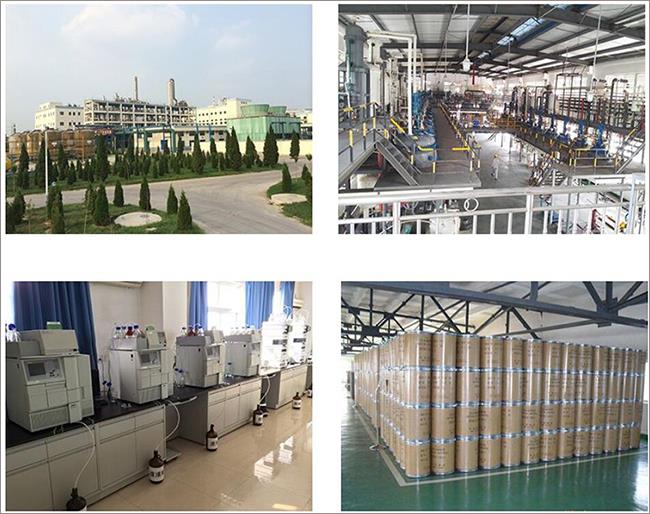
Founded in 2006 and headquartered in Wuhan, Hubei, China, Watson Biotechnology Co., Ltd is a leading manufacturing powerhouse specializing in the production of Active Pharmaceutical Ingredients (APIs) and Intermediates, Food and Feed Additives, Agricultural and Aquaculture chemicals, and Fine Chemicals. As a dedicated factory, our operations are driven by a commitment to excellence and innovation, ensuring that our products meet the highest standards of quality and compliance.
With a robust team of over 100 skilled professionals, Watson Biotechnology has established itself as a trusted name in the industry. Our products are meticulously crafted to align with international standards such as USP (United States Pharmacopeia), EP (European Pharmacopoeia), and BP (British Pharmacopoeia), guaranteeing reliability and efficacy.
At Watson Biotechnology, we pride ourselves on our cutting-edge facilities and state-of-the-art technology, which enable us to deliver superior products that cater to a diverse range of needs across various sectors. Our dedication to continuous improvement and customer satisfaction drives us to maintain stringent quality control processes and foster an environment of innovation and growth.
Watson Biotechnology Co., Ltdis a professional manufacturer which provide Linoleic Acid with good quality and best price, welcome to contact us to get COA/TDS/MSDS of Linoleic Acid.
Company Profile Introduction
Founded in 2006 and headquartered in Wuhan, Hubei, China, Watson Biotechnology Co., Ltd is a leading manufacturing powerhouse specializing in the production of Active Pharmaceutical Ingredients (APIs) and Intermediates, Food and Feed Additives, Agricultural and Aquaculture chemicals, and Fine Chemicals. As a dedicated factory, our operations are driven by a commitment to excellence and innovation, ensuring that our products meet the highest standards of quality and compliance. With a robust team of over 100 skilled professionals, Watson Biotechnology has established itself as a trusted name in the industry. Our products are meticulously crafted to align with international standards such as USP (United States Pharmacopeia), EP (European Pharmacopoeia), and BP (British Pharmacopoeia), guaranteeing reliability and efficacy. At Watson Biotechnology, we pride ourselves on our cutting-edge facilities and state-of-the-art technology, which enable us to deliver superior products that cater to a diverse range of needs across various sectors. Our dedication to continuous improvement and customer satisfaction drives us to maintain stringent quality control processes and foster an environment of innovation and growth. Join us at Watson Biotechnology Co., Ltd as we continue to pioneer advancements in biotechnology and contribute to a healthier, more sustainable future.
